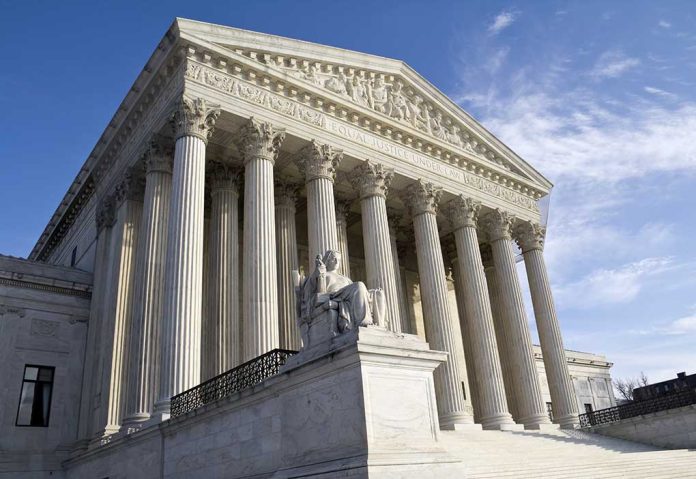
The Supreme Court is set to hear a case that could significantly impact deportation appeal deadlines for noncitizens facing persecution, potentially altering the landscape of immigration enforcement.
At a Glance
- Supreme Court to hear Velazquez v. Garland on November 12, 2024, addressing circuit split on immigration appeal deadlines
- Case highlights conflict between Tenth and Ninth Circuits on handling weekend/holiday deadlines
- Decision could affect thousands of pending cases and set national standard for appeal timelines
- Recent Supreme Court ruling allows federal court review of “exceptional hardship” cases
Supreme Court Takes on Critical Immigration Case
The U.S. Supreme Court is preparing to hear a pivotal case, Velazquez v. Garland, on November 12, 2024. This case will address a significant split between circuit courts regarding the deadline for voluntary departure of noncitizens. The decision could have far-reaching implications for immigration enforcement and the rights of those seeking protection under U.S. law.
At the heart of the matter is a conflict between the Tenth and Ninth Circuits. The Tenth Circuit has ruled that voluntary-departure deadlines are strict, even when they fall on weekends or holidays. In contrast, the Ninth Circuit allows for an extension to the next business day in such cases.
The Supreme Court will consider if federal appeals courts can review appeals from non-citizens claiming they’ll be killed or tortured if deported that are filed more than 30 days after a removal order is issued.https://t.co/tmcYtJm409
— Bloomberg Law (@BLaw) November 4, 2024
Potential Impact on Immigration Enforcement
The Supreme Court’s decision could significantly impact the interpretation of filing deadlines and the discretion of administrative agencies to extend them. This ruling may affect countless noncitizens who have relied on the practice of extending deadlines to the next business day when they fall on weekends or holidays.
“The U.S. Court of Appeals for the Tenth Circuit held that, regardless of what day of the week a voluntary-departure period expires, the law requires a noncitizen moving to reopen or reconsider removal proceedings to file within the calendar-day period set in the voluntary departure order.” – JacksonLewis
The case also brings attention to the broader question of how immigration judges handle cases involving claims of persecution or torture. The Court’s decision will likely set a national standard for appeal timelines, potentially affecting thousands of pending cases.
Recent Supreme Court Precedent
This case follows a recent Supreme Court decision in March 2024, which demonstrated the Court’s willingness to examine immigration judge decisions. In a 6-3 ruling, the Court allowed federal courts to review cases involving “exceptional hardship,” establishing new oversight on deportation proceedings.
“The US Supreme Court will consider if federal appeals courts can review appeals from non-citizens claiming they’ll be killed or tortured if deported that are filed more than 30 days after a removal order is issued.” – Bloomberg Law
This precedent suggests that the Court is open to examining the nuances of immigration law and ensuring due process for those facing deportation. The upcoming case will likely build on this foundation, potentially expanding or clarifying the rights of noncitizens in the appeals process.
Sources:
- Supreme Court Agrees to Review Deadline for Deportation Appeals
- U.S. Supreme Court to Consider Circuit Split on Voluntary-Departure Deadline
- Justices Will Hear Appeal of Jamaican Who Says He’ll Be Killed If Deported
- Supreme Court to Review 30-Day Appeal Window in Immigration Removal Case














